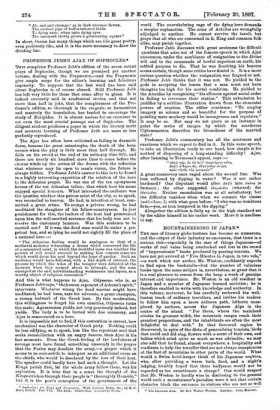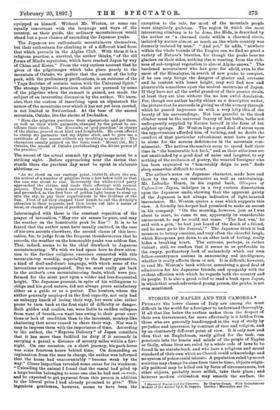MOUNTAINEERING IN JAPAN.* THE race of literary globe-trotters has become
so numerous, and the output of their industry so enormous, that there is a serious risk—especially in the case of things Japanese—of works of real value being overlooked and lost in the crowd of "impressionist" books produced by passing tourists. We have not yet arrived at "Five Minutes in Japan, in two vols," —a work which our author, Mr. Weston, confidently expects to find upon the bookstalls—but the number of valueless books upon the same subject is, nevertheless, so great that it is a real pleasure to rescue from the heap a work of genuine interest and importance. Mr. Weston is an old resident in Japan and a member of Japanese learned societies ; he is therefore enabled to write with knowledge and authority. In this volume, moreover, he has carefully eschewed the well- beaten track of ordinary travellers, and invites his readers to follow him upon a more arduous path, hitherto unex- plored by authors, across the Japanese Alps in the centre of the island. "For there, where the mainland attains its greatest width, the mountain ranges reach their grandest proportions, and the inhabitants are often the most delightful to deal with." In that favoured region he discovered, in spits of the dicta of generalising tourists, birds that could and did sing, flowers with a scent of their own, and babies which cried quite as much as was advisable; we may also add that he found, almost everywhere, a hospitality and readiness to help the traveller that are not always conspicuous at the foot of mountains in other parts of the world. What would a Swiss hotel-keeper think of his Japanese confrere, who, after providing a warm bath, food, and a night's lodging, humbly hoped that three halfpence would not be regarded as too extortionate a charge P One would suspect that Mr. Weston is hardly wise in disclosing to the general world such a mountaineer's paradise, were it not that certain obstacles block the entrance to visitors who are not so well • The Japanese Alps. By Rev. Walter Weston. London : John Murray.
equipped as himself. Without Mr. Weston, or some one equally conversant with the language and ways of the country, as their guide, the ordinary mountaineers would stand but a poor chance of ascending the Japanese peaks. The Japanese are enthusiastic mountaineers themselves, but their enthusiasm for climbing is of a different kind from that which prevails in the Alpine Club. With them it is a religions practice, a survival, the author thinks, "of the old forms of Hindu mysticism, which have reached Japan by way of China and Korea." From the very curious account that he gives of the pilgrimages which take place yearly to the mountain of Ontake, we gather that the ascent of the lofty peak, with the preliminary purifications, is an outcome of the "Yoga doctrine of ecstatic union with the Universal Spirit."
The strange hypnotic practices which are pursued by some of the pilgrims when the summit is gained, are made the subject of an interesting discussion by the author. We learn, also, that the custom of inscribing upon an alpenstock the names of the mountains over which it has not yet been carried, is not limited to Switzerland. At the base of the sacred mountain, Ontake, lies the shrine of Iwohaiden.
" Here the pilgrims purchase their alpenstocks and get them, as well as their white garments, stamped by the priest to cer- tificate their climb. The Kannushi, or 'god guardian' in charge of the shrine, proved most kind and hospitable. He even offered to stamp my garments and my Alpine stick, and to give me a certificate of the ascent without my troubling to make it ! The characters usually printed on the tunic read : Mount (lit., Mr.) Ontake, the ascent of Ontake (certificating) the divine power of the practice.'"
The ascent of the actual summit by a pilgrimage must be a striking sight. Before approaching near the shrine that stands there the previous day must be spent in elaborate ablutions
" As we stood on our vantage point, 10,000 ft. above the sea, the arrival of a number of pilgrims from a hut below told us that the sun was about to rise. Reverently the white-robed party approached the shrine, and made their offerings with earnest prayers. They then turned eastwards, as the shrine itself faces, and proceeded, as the first bars of golden light began to steal up into the sky, to pay their supplications to the Goddess of the Sun. First of all they clapped their hands to call the divinity's attention to their requests, and then broke out into a series of harai, or chants of prayers of purification."
Intermingled with these is the constant repetition of the prayer of invocation, "May our six senses be pure, and may the weather on the honourable peak be fine "! It is to be feared that the author must have usually omitted, in the case
of his own ascents elsewhere, the second clause of this invo- cation, for, to judge from the frequent thunderstorms that he records, the weather on the honourable peaks was seldom fine. That, indeed, seems to be the chief drawback to Japanese mountaineering. We wish we had space here to draw atten- tion to the further religious exercises connected with this mountain-top worship, especially to the finger gymnastics, a kind of deaf-and-dumb language, with which some of the invocations are accompanied. But we must really get back to the author's own mountaineering feats, which were per- formed for the most part upon a wilder and less-frequented height. The Japanese peasant, in spite of his willingness to oblige and his good nature, did not always prove satisfactory either as a guide or as a porter. The hunters, whom the author generally employed in the first capacity, not only had an unhappy knack of losing their way, but were also rather prone to turn back at the first sight of difficulty or danger.
Both guides and coolies, too, were liable to sudden collapses from want of breath,—a want less owing to their great exer- tions or lack of condition than to the incessant, monkey-like chattering that never ceased to cheer their way. Nor was it easy to impress them with the importance of time. According to the author, the "Express Delivery" of Japan considers that it has more than fulfilled its duty if it succeeds in carrying a parcel a distance of seventy miles within a fort- night. On one occasion, on a short journey, his pack-horse was some fourteen hours behind time. On demanding an explanation from the man in charge, the author was informed
that the horse had unaccountably "become weak by the way." Closer inspection revealed some cause for its weakness. "Unloading the animal I found that the rascal had piled up a large burden belonging to some one else he had met en route,
and he expected to get payment from this person in addition to the liberal price I had already promised to give." This ingenious gentleman, however, seems to have been the exception to the rule, for most of the mountain people were singularly guileless. The region in wnich the most interesting climbing is to be done, the Hida, is described by the author as "a charmed circle within a charmed circle, isolated by nature almost as much as the whole country was formerly isolated by man." "And yet," he adds, 'nowhere within the whole bounds of the Empire can we find so great a variety of Nature's beauties, for though the peaks bear no glaciers on their sides, nothing else is wanting, from the rich- ness of sub-tropical vegetation to almost Alpine snows." The hardened mountaineer who has gone far afield, even to the snow of the Himalayas, in search of new peaks to conquer, if he can only forego the dangers of glacier and crevasse and be content with lesser height, may well find new and pleasurable sensations upon the modest mountains of Japan. If they have not all the awful grandeur of their greater rivals, at least they are also without the no less awful desolation. For, though our author hardly shines as a descriptive writer, the picture that he succeeds in giving us of the scenery through which he passed impresses us with a very lofty idea of the beauty of his surroundings. Not less grateful to the tired climber must be the universal luxury of hot baths, baths not, unfrequently supplied by Nature herself in the form of hot sulphur springs. Mr Weston lays a good deal of stress upon the opportunities afforded him of bathing, and no doubt the comfort of that particular refreshment must have gone far to atone for the serious deficiencies in the mountain com- missariat. The natives themselves seem to spend half their time in "the honourable hot bath," and as their ablutions are not unattended by a good deal of noise and laughter, to say nothing of the recitation of poetry, the wearied foreigner who. has been requested to "honourably deign to rest" finds sleep somewhat difficult to court.
The author's notes on Japanese character, made here and there by the way, are instructive as well as entertaining. Mr. Lafeadio Hearn, in his capital book, Glimpses of Unfamiliar Japan, indulges in a very curious dissertation upon the Japanese smile, showing that the apparent gaiety of the Japanese is not always indicative of light-hearted insouciance. Mr. Weston quotes a case which supports this view. A friendly inn-keeper had promised to make an ascent in his company. "On the morning, however, just as I was about to start, he came to me, apparently in considerable amusement, to say he could not come. The fact was,' he said with a grin, he had, just heard of the death of a friend, and he must go to the funeral." The Japanese think it bad manners to betray emotion, and very often the cheerful laugh, which Europeans put down to an utter lack of feeling, really hides a breaking heart. The extreme, perhaps, is rather violent ; still, we confess that it seems to us preferable to the empty, perfunctory look of melancholy which our own fellow-countrymen assume in announcing sad intelligence, whether it really affects them or not. It is difficult, however, to read Mr. Weston'a book without conceiving a good deal of admiration for his Japanese friends, and sympathy with the evident affection with which he regards both the country and its people. It is also a great relief to read a book upon Japan, in which that much-advertised young person, the geisha, is not even mentioned.



































 Previous page
Previous page